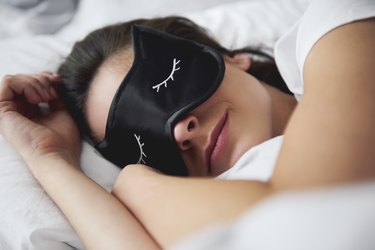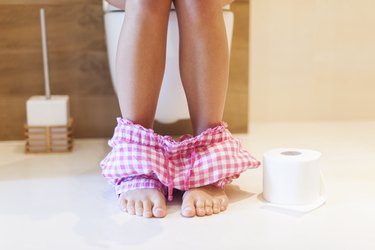
Not getting enough shut-eye is linked to weight gain, a foul mood, trouble concentrating and even chronic diseases like high blood pressure and type 2 diabetes. But did you know it can affect your bathroom routine, too?
"We now think sleep — especially too little or poor-quality sleep — can impact your bowel habits and cause symptoms such as constipation and diarrhea," says Kyle Staller, MD, MPH, a gastroenterologist and the director of the Gastrointestinal Motility Laboratory at Mass General.
Video of the Day
Video of the Day
While a good night's rest won't solve all your GI woes, getting enough winks regularly — and keeping to a consistent sleep schedule — can help. Read on to hear what experts and science have to say about the link between your sleep and poop.
Related Reading
1. Most People Feel the Need to Poop Soon After They Wake Up
If you always feel like you've got to go pretty soon after you wake up then that's just a sign your GI tract is doing exactly what it's supposed to, says Jill Deutsch, MD, Yale Medicine gastroenterologist.
"Your colon has its own internal clock that stimulates it to release a surge of hormones such as cortisol, which causes it to contract more vigorously," she explains.
This in turn propels all the poop left over from the previous day forward into your rectum, which leads to you heading to the john about thirty minutes after getting up.
You can help speed up this process with a morning routine that includes light movement like stretching, eating breakfast and drinking fluids, especially coffee.
If you do feel the urge to go, don't hold it in — this can set you up for constipation down the road, Dr. Deutsch says. Build in some extra time in the a.m. so you don't have to rush it in the bathroom.
Related Reading
2. Too Little — or Too Much — Shut-Eye Can Lead to Bowel Problems
Both decreased and increased sleep can lead to constipation, according to a study presented by Dr. Staller in May 2020 at Digestive Disease Week.
Getting between seven to eight hours of zzzs a night appeared to be the sweet spot, with people who got more or less than that amount reporting that they were 30 percent more likely to be plugged up.
"One theory is that sleep has some sort of restorative role when it comes to regulating bowel movements," Dr. Staller explains. "If you're not getting enough sleep — or very poor-quality sleep — then your brain may not be providing enough cues to allow your bowel to wake up in its traditional fashion and contract."
People who sleep much more than eight hours, he notes, may have an underlying condition such as sleep apnea that prevents them from getting the restorative rest they need.
3. Jet Lag Can Mess Up Your GI Tract
You've probably experienced the so-called "travelers' constipation," where you feel more backed up than the New Jersey Turnpike while on vacation. One big reason for this is jet lag, explains Christine Lee, MD, a gastroenterologist at the Cleveland Clinic.
"When you switch time zones and are thrown off of your sleep routine, it disrupts your circadian rhythms," she explains.
As a result, your body becomes confused, and that morning cortisol surge you normally experience doesn't happen. A February 2003 study in the The American Journal of Gastroenterology looked at people traveling from Europe to the United States and found that nearly 40 percent reported constipation — and symptoms were worse the more pronounced their jet lag.
This also helps explain why shift workers are more susceptible to conditions like irritable bowel syndrome, Dr. Lee says. "When work times constantly switch around, your brain may know what time it is, but your body hasn't had a chance yet to swap out its night and day patterns, which plays havoc with your digestive tract."
An April 2010 study in the The American Journal of Gastroenterology found that almost half of all rotating-shift nurses reported symptoms of irritable bowel syndrome such as diarrhea or constipation compared to only about a third of day-shift nurses.
Related Reading
4. Sleep Affects Your Microbiome
Your microbiome — the mix of good and bad bacteria found in your digestive tract — is linked to sleep. Better sleep quality is significantly associated with a healthier microbiome, according to an April 2019 study in the medical journal Sleep.
But whether a poor microbiome affects sleep patterns, or sleep quality affects microbiome is still unknown.
"It's a bit of the chicken or the egg syndrome," Dr. Lee says.
But if you are sleep-deprived, she adds, your body releases specific hormones known as cytokines that promote inflammation.
"These may not only alter your gut bacteria, but they can also lead to carbohydrate cravings and binge eating that further impact your microbiome," she says. This in turn can lead to GI problems such as bloating or diarrhea.
Related Reading
4 Tips for a Better Sleep-Poop Schedule

It's pretty clear by now that the quality of your sleep and your poop are closely tied together. Here's how to optimize both.
1. Stick to Consistent Sleep/Wake Times
Even if you're a shift worker, this will help regulate your circadian rhythms, so your body doesn't get confused, Dr. Lee says. This in turn can help with regular pooping.
2. Push Plenty of Fluids
This is particularly true if you're traveling, since flying on a plane can cause dehydration. But in general, loading up on H2O "will help soften your stool so it's easier to pass," Dr. Lee explains.
3. Eat a Prebiotic-Rich Diet
Prebiotics are food for the trillions of tiny organisms in your gut, says Michael Breus, PhD, a sleep specialist and author of The Power of When. High-fiber plant foods are good sources of prebiotics, including asparagus, apples, artichokes and bananas as well as onions, leeks and garlic.
A March 2020 study in Scientific Reports found that a prebiotic-rich diet produces positive changes in the brain (via the gut-brain connection) that help improve sleep.
4. Be on the Alert for Symptoms of Sleep Problems
If you have trouble falling asleep or feel you're not getting good-quality sleep (you're waking up frequently, or you wake up not feeling refreshed), check your sleep routine. Habits like using screens, eating large meals or drinking caffeine before bed can make it more difficult to get quality sleep, according to the Centers for Disease Control and Prevention.
If you do have healthy sleep habits and yet you still have difficulty snoozing, see your doctor. He or she can screen you for conditions such as sleep apnea, which can impact your zzzs.
One red flag: waking up in the middle of the night to poop, says Dr. Deutsch: "It could indicate an inflammatory bowel disease such as colitis, especially if it's diarrhea."
- Digestive Disease Week: "Abnormal Sleep Duration Is Associated With Constipation in a National Study"
- The American Journal of Gastroenterology: "Traveler's Constipation"
- The American Journal of Gastroenterology: "The Impact of Rotating Shift Work on the Prevalence of Irritable Bowel Syndrome in Nurses"
- Sleep: "Sleep Duration and Quality and Diversity of the Gut Microbiome in a General Population Sample of Adults"
- Scientific Reports: "Dietary prebiotics alter novel microbial dependent fecal metabolites that improve sleep"
- Centers for Disease Control and Prevention: "Tips for Better Sleep"
Is this an emergency? If you are experiencing serious medical symptoms, please see the National Library of Medicine’s list of signs you need emergency medical attention or call 911.